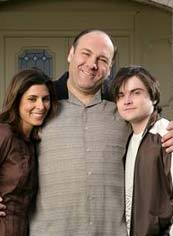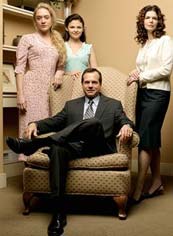 Someone I know once said, in reference to the poorly received season six of HBO’s “The Sopranos,” “What does David Chase care, he’s living in a f–king castle in France.” Now I don’t know if Chase lives in a castle in France, nor will I spare the time to Google it, since the point is that that particular comment immediately sprung to mind at the jarring ending of last night’s series finale.
Someone I know once said, in reference to the poorly received season six of HBO’s “The Sopranos,” “What does David Chase care, he’s living in a f–king castle in France.” Now I don’t know if Chase lives in a castle in France, nor will I spare the time to Google it, since the point is that that particular comment immediately sprung to mind at the jarring ending of last night’s series finale.
David Chase has “stugots.” Like millions of Americans, I thought my cable had gone out right at the precise moment of Tony Soprano’s violent demise, the denouement of the Don. Sitting in a diner with Carmela, A.J. and waiting for Meadow, Tony watches several of the customers with a leery eye as Journey’s “Don’t Stop Believing” plays on the jukebox, and we witness the increasingly frustrated Meadow try to parallel park her car just outside.
Tensions mount as Meadow pulls in and out of the spot, scraping her hubcaps against the curb, as patrons look about with darting eyes and head to the men’s room, A.J. repeats seemingly ominous advice Tony once gave him, “Always remember the good times.” Meadow manages to finally park the car, enters the diner, and … BLACK! Nothing but blackness for a good 10-15 seconds. Roll credits.
Otherwise, the episode wasn’t remarkable. It was, for all intents and purposes, a regular “Sopranos” episode, with Paulie Walnuts supplying comic relief with a cat who may be Christopher Moltisanti reincarnate, Phil Leotardo getting whacked, FBI Agent Harris sinking deeper into his own brand of corruption, and A.J. returning to some normalcy, being a couch potato, but a politically-minded potato.
Where was the incredible, glorious, violent ending that last week’s episode seemed to promise? Instead, faithful viewers were treated to vignettes of Tony as family man–talking to Uncle Junior and realizing he truly is suffering from dementia, consoling his sister after her husband’s death, respecting A.J.’s decision to enlist in the army but setting up an alternative position for him in the “movie industry.”
“Where is this going,” I asked 20 minutes in, 37 minutes in, 48 minutes in. Surely something is about to happen. And it did, but not in the way that was expected. Carlo, one of Tony’s loyal henchman, flipped and was slated to testify against Tony. And while Tony seemed concerned, he also seemed relieved. As his lawyer said, “We always knew this would happen one day.” Just as we the audience knew that one day the series would come to an end.
In my mind, “The Sopranos” has always been a wonderful analogy for the ennui felt in typical suburban America–the struggles and challenges of everyday families amped up. And while the finale seems to have jettisoned the entire Tony in therapy six-year storyline, it’s quite fitting that it ended the way it did–not with a bang, but with a whimper, and an average one with that.
While many are theorizing that we didn’t get to see Tony’s subsequent assassination, I think Chase was merely feeding the audience red herrings with the pans to the sketchy customers and stress-inducing cuts to Meadow and her parking problem (unless Iler and Sigler have signed on for a spin-off). Tony and family will go on, just like most American families, living their day-to-day lives and facing life’s big and little problems the only way they know how.


